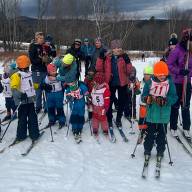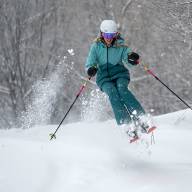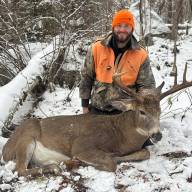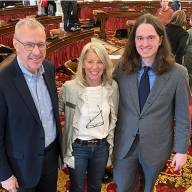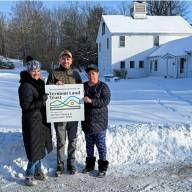Fayston shepherd Helen Whybrow’s “The Salt Stones – Seasons of a Shepherd’s Life,” is receiving well-deserved praise and acclaim. It is a nonfiction finalist for the New England Book Award and is one of my top reads of 2025.
Whybrow’s book reflects her years learning to raise sheep at the Knoll Farm where she lives with her husband and family. But it’s about much, much more than that. I read the book avidly, noting passage after passage to quote in this review. But there were too many!
Whybrow is clearly a lover of words and books, and she does not shy away from difficult subjects. She’s writing about farming, learning to be a shepherd, birth and death and prey and motherhood, butchering lambs, learning and acceptance. There’s no sugarcoating the hard stuff. It’s intimate, heartbreaking, inspiring and so carefully and sparely written; it’s like each word was chosen with care. It's a tale of restorative farming that looks at the entire concept of farming and animal husbandry from an exacting lens that excuses nothing and aspires to everything.
Here's one quote that comes from a chapter on coyotes and losing lambs to them. Whybrow and her husband Peter Forbes are on their bellies in a field in the hot grass stalking a coyote that has taken their lambs, Peter with a 22-gauge rifle. The prelude to the scene is a meticulous examination of coyotes and how they’ve been dealt with over the last centuries. That examination does not reflect well on all of us.
“On a farm, nature gives us everything we have. It’s the genesis and genius of every seed, every particle of humus, every mycorrhizal strand, every fruit-bearing tree. It seems only right that we harvest some and give some back. The lambs that go back to the earth through the belly of a coyote, or the countless blueberries eaten by a cedar waxwing, are seen as “crop loss,” “damage,” or “failure.” I am learning to appreciate them as return, as gift, as exchange. The taker of the lamb can be the deity, the trickster who is also the thunder maker and brings the rain, the balancer of life and death that helps us see our humility and purpose as one cog in a greater, infinitely wiser wheel. It’s all a matter of perspective. And perspective may be everything if we are going to turn around the path of destruction our belief of dominance has set us on.”
“We never shot a coyote. Instead, we adapted, and things improved. We stopped burying sheep on the farm. We installed a dog-proof fence around the lambing paddock. We got another guard llama, Habibi – a magnificent, nervous animal with huge eyes and long ears who has the instinct to herd the sheep to the highest point in every pasture at dusk – and an English shepherd pup, Rue.”
“The Salt Stones” reflects a Valley we know and people in it, its seasons, its challenges as the climate changes, but also a deep love of place. If you love words and books, and timely reflections on how to live in these challenging times, as well as the importance of trying to align yourself with something more natural than the artifice created by our phones and our digital lives, this book will be a balm.



